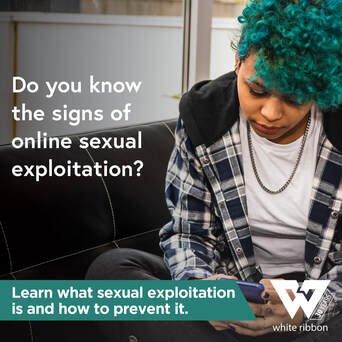
What Do I Do If Someone Tells Me That They Are Or Have Been Sexually Exploited?
Whether you are a parent, guardian, caregiver, educator or a youth, there are some important things to consider when someone has confided in you that they are a survivor of online sexual exploitation. If someone has disclosed to you that they are a survivor of online sexual exploitation, there are some important steps you can take to support this person.
Here’s What You Can Do
Listen
When someone has selected you as trusted person to disclose their abuse to, listen to their story. Do not interrupt them and do not probe for details. Listen attentively and with emphathy. Disclosing abuse is a vulnerable time for survivors. It may be very retriggering and if they have selected you as the individual to share this with, know this was not a decision they made lightly. Thank them entrusting you and for trust you and ask them what they need to learn how you can best support.
Believe Them
It is important to let them know that you believe them. If someone is a victim of online sexual exploitation or another form of abuse, let them know that it is not their fault. Try not to ask them any questions and do not suggest that there is something they could have done differently to change the outcome – it is never the victim’s fault. Let them know that you believe them, and they are not alone and there are places they can go for support.
Share Resources
Once they have shared their story, ask them what they need and if there is anything you can do to help them feel safe. It may be too soon to develop a complete action plan; however, after they have spoken, check in to see what they need and share age appropriate supports that may help.
Respect Their Decision
Disclosure is a big step for survivors. One that can build anxiety and resurface other feelings or trauma. It is important to support survivors by respecting their process and their decisions. Follow their lead and respect their choices.
Listen, believe and support their choice.
Parents, guardians and caregivers:
It is important to know the facts. For example, sexting can happen with children as young as 12 or 13 years old. When your child receives a personal device, talk to them and teach them how to text, chat, search and surf safely. For instance, let them know to never take or send explicit photos, even to people they know. Be proactive and make sure youth and their devices are safeguarded:
Ensure parental controls are enabled on apps and devices to minimize risk and exposure to questionable sites.
Keep devices in common areas to keep a watchful eye on children.
Keep the lines of communication open with the young people and youth in your life.
Create space to have conversations with the youth in your life. Let them know they can talk to you, whether it is about themselves, a friend or a peer. Let them know you are there.



